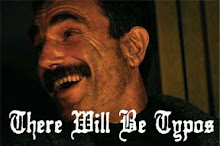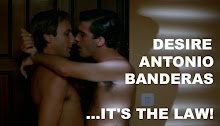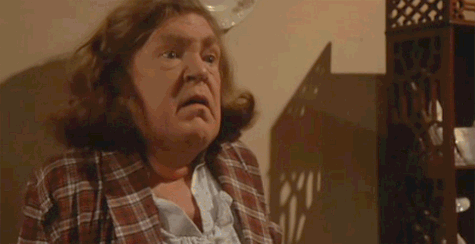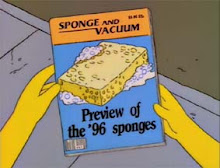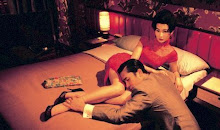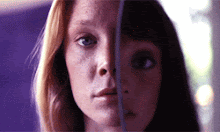I'm a simple man. All I want for Christmas are a few DVD's. There's just one catch...
They don't exist.
Where are my "ultimate, unrated, too shocking, too sacrilegious" special editions of these hard-to-find classics? Santa's got his work cut out this year after securing rights, conducting rare cast interviews, and scouring the earth for restored prints and never-before-seen footage...
Come Back to the Five and Dime, Jimmy Dean, Jimmy Dean
And then come to DVD... Jimmy Dean, Jimmy Dean...

It's a stage play as much as it is one of Robert Altman's fluid cinematic dreams, centralized in a dusty town that has long seen its Last Picture Show. An aging club of James Dean devotees, still swooning over their legendary encounters with the star, reconvene years later to reveal the secrets and lies of their shared past.
It's a showcase for performances both theatrical and understated by an A-list cast the likes of Cher, Kathy Bates and Sandy Dennis. Special mention goes to Karen Black as a transsexual transformed (via a surgeon with a sense of humor) from "don't call me queer" Jesse (Mark Patton) of A Nightmare on Elm Street Part 2. And he's just as gay this time around, maybe a bit less.

It's not known as one of Altman's greats if only because of some flaws within the source material, but his translation to screen is masterful, as is his clever play with time and space. Confined to a singular sleepy locale, Altman brings about the ache of his characters and their crumbling facades on par with that of their dying town.
Ideal Extras: How great would an actress commentary be? Cher and Sandy Dennis give especially memorable turns here and it would be nice to hear their experiences with the late, great Robert Altman. They could even reunite the cast at a five and dime somewhere to talk about their glory days on set together. We can always hope for some trash talk and a few life-altering tragedies along the way.
The Devils
Not on DVD? Sacrilege! Let's burn Warner Brothers!

Director Ken Russell trips out on blasphemy, orgies and eye popping art design, plus Vanessa Redgrave as a horny hunchback in a habit. Unfortunately these things don't come along everyday, and as an added bonus, this movie apparently offends Catholics.
Urbain Grandier (Oliver Reed), a corrupt 17th Century priest, is swept up in the hysteria of witchcraft after a repressive nun (Redgrave) lusts and then lies about the father's seductive powers. The far greater corruption within the church spins the web of lies into a grand panic filled with sex, sacrifice and holy sacrament. The darkly funny and fact-based film offers grand production design by Derek Jarman and a rare take on religious frenzy.

Scheduled for release last year, the disc was pulled by Warner Brothers almost immediately after being announced. No reasons were given, but either the Pope caught wind of the nun gangbang or there was a property rights issue. We'll hope for the former.
Ideal Extras: The most important being the fully restored print of the film -- a difficult enough feat considering the many versions in circulation and cuts made around the world. The infamous (and irreverently titled) "Rape of Christ" sequence should be fully restored, or in lieu of that, humorously recreated by a modern day Vanessa Redgrave.
Love Streams
Someone buy the studio execs a farm to show them our love and devotion. That should do it.

The masterful humanism of John Cassavetes bleeds through this painful, honest and heartfelt story of a brother and sister trying to find love and express it to others by any means necessary. Robert Harmon (Cassavetes), an author and alcoholic by equal esteem, spends his days keeping his many lovers and recently reunited son at bay. Sarah Lawson (Gena Rowlands) tries to adapt to her dissolving marriage and stilted relationship with her daughter through elaborate expressions of her affection, no matter the greater distance they cause.
Stunning performances and Cassavetes' signature nuance and naturalism capture immense truth and tragedy, not to mention some hilarious comic moments as Sarah's character moves further off the deep end. Based on a play by Ted Allen, the film never feels out of step with Cassavetes' invasive realism, and it's yet another career peak for Gena Rowlands. I'd express my love for her in the most awkward and exaggerated way possible if I only knew how...

Ideal Extras: Perhaps a second Cassavetes box set from Criterion? We do still need Minnie and Moskowitz and Husbands on disc as well. Imagine rare interviews, extended footage, lost scenes and essays by Gena Rowlands. And scene selections, probably.
Looking for Mr. Goodbar
Such a vicious and tragic tale, tied to its era and told with a harrowing edge that still has bite. Diane Keaton, in one of her finest and most daring performances, plays Theresa Dunn, a teacher of deaf children by day who's seeking out illicit sex and drugs after sundown. Her encounters with strange men become an escape from the past that had kept her so contained, but ultimately lead her to a terrifying fate.
The story and novel by Judith Rossner was based on the murder of schoolteacher Roseann Quinn in 1973, which certainly adds to the film's bleakness. The psychology and themes inside are about as conflicted and distraught as the central character, but so often the film achieves a chilling and uniquely fascinating quality. Much of that is due in part to Keaton's strength and savvy onscreen, as well as the inevitable horror awaiting us as the viewer.

Ideal extras: Director Richard Brooks must have a lot to say considering the content, and every fan should be intrigued to hear the story of its inspiration. Plus, interviews with Diane Keaton in which she talks about her golden era of edgy roles and then apologizes for Because I Said So. Why? Because I said so. The cherry on top is rare extended footage of Richard Gere and Tom Berenger in their debut, looking cute and coked out in jockstraps.

































